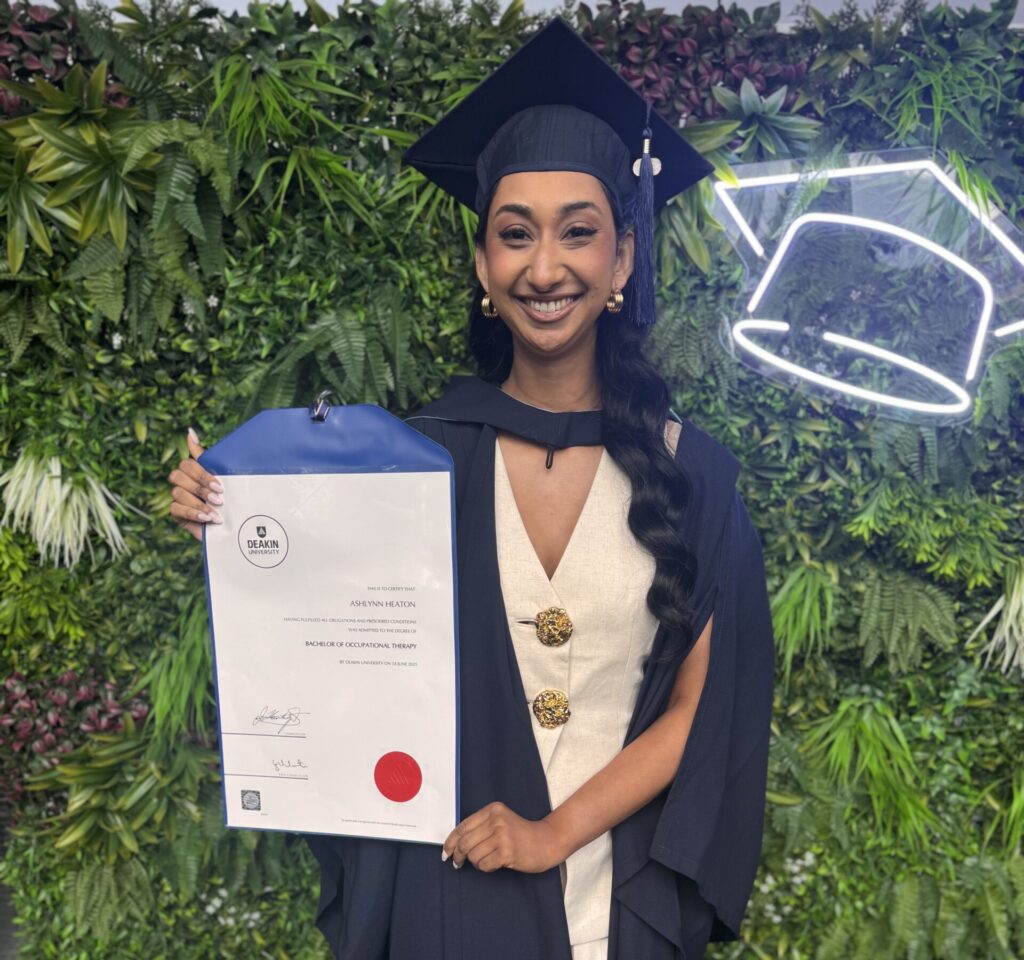Finishing a university degree can be a challenge at any time. Doing it while going through intense cancera disease where abnormal cells split without control and spread to other nearby body tissue and/or organs treatment adds even more complexity, but it is possible with the right support.
Ashlynn, 26, was nearing the end of her occupational therapy degree when she started to experience uncomfortable menstrual symptoms, abdominal cramping, bloating, fatiguea state of extreme tiredness or exhaustion, can be physical or mental, and a loss of appetite.
A scan initially revealed an ovarian cyst, but further testing raised new concerns. Blood teststesting done to measure the levels of certain substances in the blood showed her alpha-fetoprotein (AFP) tumoura tissue mass that forms from groups of unhealthy cells marker was significantly trending upwards from the initial results. Normal AFP levels are typically between 2 and 10, but on the day of surgerytreatment involving removal of cancerous tissue and/or tumours and a margin of healthy tissue around it to reduce recurrence hers measured 6,600. An additional MRI scan, combined with the rising AFP, suggested the cyst was more suspicious than first thought, and she was referred to the gynaecological oncologythe study, diagnosis and treatment of cancer team for surgery.
She underwent surgery to remove the cyst, still without a confirmed pathologythe study of disease result and not fully believing it could be anything of serious concern.
Post-surgery, she was told the massa growth of cells that come together to make a lump, may or may not be cancer was “most likely cancer,” pending pathology confirmation. She received this news alone, feeling terrified and overwhelmed. Ashlynn sat there considering her future, thinking, ‘What about uni? What about my hair?’
One week later, pathology confirmed the diagnosisthe process of identifying a disease based on signs and symptoms, patient history and medical test results: a rare ovarian mixed germ cell tumour.
Although her mother had previously been treated for ovarian cancer, Ashlynn never expected to face a similar diagnosis at such a young age. Just two weeks into her own cancer journeywhat a person experiences/lives from the time they think they have cancer, her father was diagnosed with bowelportion of the digestive system that digests food (small bowel) and absorbs salts and water (large bowel); also called intestines cancer. The news added another layer of worry, yet she knew they could lean on each other for strength and support.
“Through it all, I was confused. How did this happen to all of us?”
“I knew a bit about it, but I didn’t think it would happen to me,” she added. “I’m a young, fit, healthy person. I don’t drink, I don’t smoke, I do all the right things. When the doctors told me, I thought, ‘you’ve definitely got this wrong’. I think I was in denial. It didn’t feel real until I started chemo.”
Ashlynn’s chemotherapya cancer treatment that uses drugs to kill or slow the growth of cancer cells, while minimising damage to healthy cells protocol was intense. Each cycle lasted three weeks. In the first week, she had five full days of treatment, followed by weekly infusions for the next two weeks. Then it was straight into the next cycle.
“To start with, I was really angry at the world. But you kind of go through acceptance; you know you have to do it.”
“This was compounded by the fact that I had good support from my family. I felt like I had to try to stay strong for the people around me.”
Ashlynn also connected with Rare Cancers Australia (RCA), who helped with some of the day-to-day burdens of having cancer. For example, during her recovery, she was still driving her dad to his cancer treatments, so RCA helped by paying for Uber Health to transport him to these appointments.
Throughout all this, Ashlynn was determined to continue her occupational therapy degree at Deakin University. The university was incredibly supportive, granting special consideration so she could complete practical learning and have flexibility on assessment due dates.
It was this support that motivated her to keep studying through treatment rather than take a leave of absence, although she admits it took “a lot of grit.”
“I just had to make the best out of the worst circumstances,” she said.
“I didn’t want to go into another year with uni still hanging over my head. If you advocate or seek help to advocate for yourself, they really want to help. If they don’t know, they can’t help you, so reach out to your uni or to someone you trust.”
Treatment was tough, draining Ashlynn’s energy while she also dealt with the emotional side of coping with cancer. Once it finished, she found it was a process to discover her new normal.
“I really had to take a bit of a systematic approach,” she said.
“If I tried to think of everything at once, it was too overwhelming. I had to think of what a normal routine looks like, day-to-day.”
Alongside rehabilitation support, Ashlynn drew on her studies and professional knowledge to gradually rebuild her fitness and endurance. She has since completed her degree and was invited to speak at her graduation ceremony earlier this year.
Simple milestones, like getting through the day without a nap, marked her progress. Gradually, she returned to normal activities such as cooking, going out with friends, and returning to work.
While physically she is on the road to recovery and has started her new job as an occupational therapist, she says her life has inevitably changed.
“After being sick for so long, I found I didn’t have much confidence,” she admits.
“Your life doesn’t magically go back to the way it was before. I think the emotional impact it has on you stays with you forever.”
